关于时间的介词
表时间的介词用法
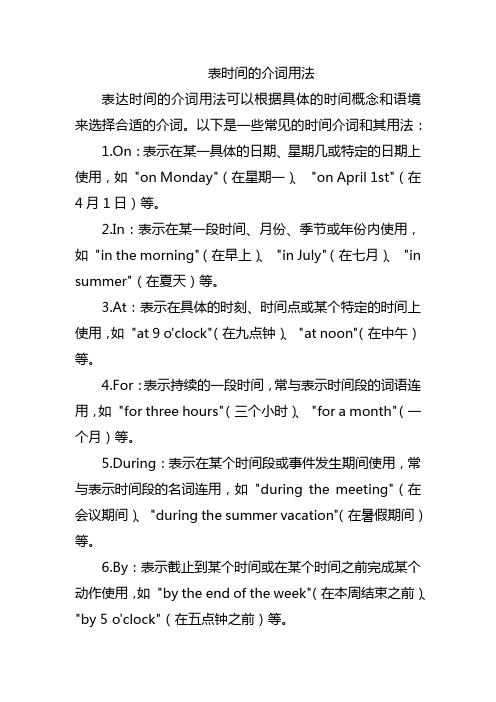
表时间的介词用法
表达时间的介词用法可以根据具体的时间概念和语境来选择合适的介词。
以下是一些常见的时间介词和其用法:
1.On:表示在某一具体的日期、星期几或特定的日期上使用,如"on Monday"(在星期一)、"on April 1st"(在4月1日)等。
2.In:表示在某一段时间、月份、季节或年份内使用,如"in the morning"(在早上)、"in July"(在七月)、"in summer"(在夏天)等。
3.At:表示在具体的时刻、时间点或某个特定的时间上使用,如"at 9 o'clock"(在九点钟)、"at noon"(在中午)等。
4.For:表示持续的一段时间,常与表示时间段的词语连用,如"for three hours"(三个小时)、"for a month"(一个月)等。
5.During:表示在某个时间段或事件发生期间使用,常与表示时间段的名词连用,如"during the meeting"(在会议期间)、"during the summer vacation"(在暑假期间)等。
6.By:表示截止到某个时间或在某个时间之前完成某个动作使用,如"by the end of the week"(在本周结束之前)、"by 5 o'clock"(在五点钟之前)等。
时间地点介词有哪些相关介词
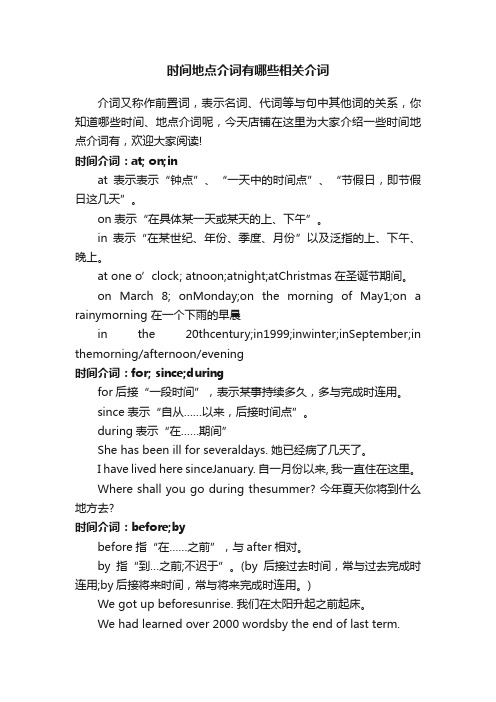
时间地点介词有哪些相关介词介词又称作前置词,表示名词、代词等与句中其他词的关系,你知道哪些时间、地点介词呢,今天店铺在这里为大家介绍一些时间地点介词有,欢迎大家阅读!时间介词:at; on;inat表示表示“钟点”、“一天中的时间点”、“节假日,即节假日这几天”。
on表示“在具体某一天或某天的上、下午”。
in表示“在某世纪、年份、季度、月份”以及泛指的上、下午、晚上。
at one o’clock; atnoon;atnight;atChristmas在圣诞节期间。
on March 8; onMonday;on the morning of May1;on a rainymorning 在一个下雨的早晨in the 20thcentury;in1999;inwinter;inSeptember;in themorning/afternoon/evening时间介词:for; since;duringfor后接“一段时间”,表示某事持续多久,多与完成时连用。
since表示“自从……以来,后接时间点”。
during表示“在……期间”She has been ill for severaldays. 她已经病了几天了。
I have lived here sinceJanuary. 自一月份以来, 我一直住在这里。
Where shall you go during thesummer? 今年夏天你将到什么地方去?时间介词:before;bybefore指“在……之前”,与after相对。
by指“到…之前;不迟于”。
(by后接过去时间,常与过去完成时连用;by后接将来时间,常与将来完成时连用。
)We got up beforesunrise. 我们在太阳升起之前起床。
We had learned over 2000 wordsby the end of last term.到上学期末为止,我们已经学了两千多个单词了。
初中英语介词总结

初中英语介词总结介词考点1、表示时间的介词表示时间的介词有at, in, after, until, before, during.1.at多用于表示具体的钟点时刻前,如:at seven, at a quarter to one; 也用于固定搭配中,如:at noon,at night。
2.in 表示一段时间,用于年、月、世纪、四季或泛指的一天的上午、下午、晚上等。
如:in the twenty-fivecentury 在21世纪,in autumn 在秋天,in the morning 在早上;还可用于表示“从现在起,多长时间以后或多久之后”3.on 主要用在星期几,具体某一天或某一天的早、中、晚或节日前。
如:on Mid-autumn day 在中秋节on June 1st在6月1日4.since,from和for(1) since指从某时一直延续至今,后接时间点,只要用完成时。
如:He has lived here since 1993. 从1993年开始他一直住这里。
(2)from说明开始的时间,谓语可用过去、现在、将来的某种失态。
如:From now on, I will learn English in the morning. 从今以后,我将在早晨学英语。
(3)for指动作延续贯穿整个过程,后接时间段,主句用完成时。
如:I have studied English for six years. 我已经学英语六年了。
5. (1)after表示以过去为起点的某一段时间之后,用于过去时。
如:They finished the work after two years. 我们两年后完成了这项工作。
(2)after 与时间点连用表示将来某个时间之后,如:I’ll ring you up after two o’clock. 我会在两点后打电话给你。
6. “by + 时间点”表示“到……以前为止”,如果by 后跟一个过去的时间点应用过去完成时。
时间前的介词用法
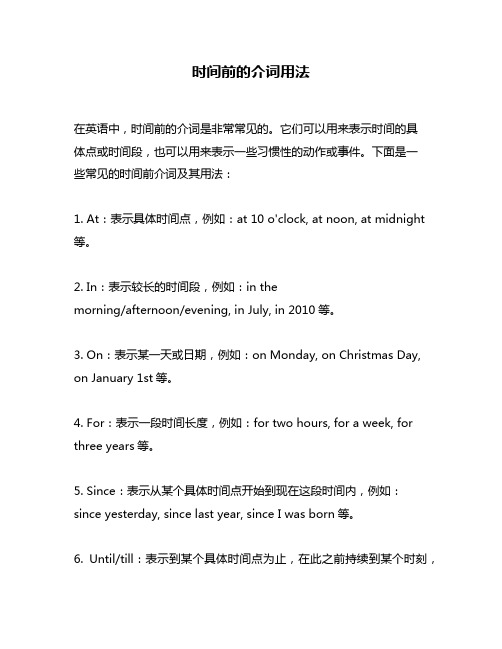
时间前的介词用法
在英语中,时间前的介词是非常常见的。
它们可以用来表示时间的具
体点或时间段,也可以用来表示一些习惯性的动作或事件。
下面是一
些常见的时间前介词及其用法:
1. At:表示具体时间点,例如:at 10 o'clock, at noon, at midnight 等。
2. In:表示较长的时间段,例如:in the
morning/afternoon/evening, in July, in 2010等。
3. On:表示某一天或日期,例如:on Monday, on Christmas Day, on January 1st等。
4. For:表示一段时间长度,例如:for two hours, for a week, for three years等。
5. Since:表示从某个具体时间点开始到现在这段时间内,例如:since yesterday, since last year, since I was born等。
6. Until/till:表示到某个具体时间点为止,在此之前持续到某个时刻,
例如:until/till tomorrow, until/till the end of the month等。
7. By:表示最晚完成某事情的限制时间,例如:by 5 o'clock, by the end of the week等。
8. From/to: 表示一个区间范围内的起始和终止点,例如: from Monday to Friday.
需要注意的是,在使用这些介词时需要注意与其他单词搭配使用时可能产生的语法错误。
同时,在口语交流中也要注意发音和语调以避免产生歧义。
表示时间介词用法

What does Jim often do on Monday
Xiaoyan: I’ve got my fitness program from the gym for this
month. Which
Mary: ⑴
class do you have tomorrow, Xiaoyan
Xiaoyan: ToWmohrorow-Tuesday-I haven’t got a class. I do gym.
一般疑问句
简略回答
Was I…
Yes, I was.
No, I wasn’t.
Were you…
Yes, we were. No, we weren’t.
Was he/she/it… Yes, he/she/it was. No, he/she/it wasn’t.
Were we…
Yes, we were. No, we weren’t.
*注意:具体某天的上午、下午或晚上要用介词on,如: They will have dinner together on Sunday evening.
*注意:以下名词与介词的固定搭配: My children play in the street in the daytime. (在
白天) I can hear the cars at night. (在晚上) I go to my mother’s house at the weekend. (在周
比较级\最高级的规则及不规则变化
▪ 1 ---er/est ▪ Tall-taller-tallest, short-shorter-shortest ▪ 2. 以e结尾-r/st nice-nicer-nicest ▪ 3.重读闭音节,双写辅音字母-er/est ▪ thin-thinner-thinnest ▪ 4.已辅音字母+y结尾 去y变I-er/est ▪ busy-busier-busiest ▪ 5.多音节形容词—more/most ▪ Relaxed---more relaxed---most relaxest ▪ Note: good-better-best bad-worse-worst
(完整版)时间介词的用法
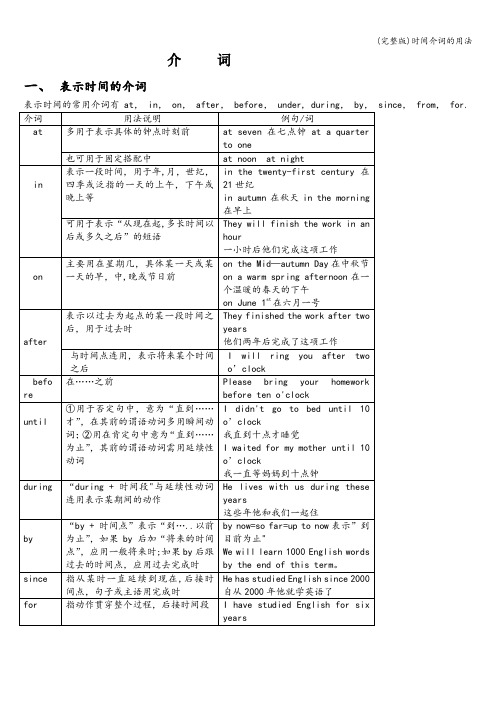
He has studied English since 2000
自从2000年他就学英语了
for
指动作贯穿整个过程,后接时间段
I have studied English for six years
这些年他和我们一起住
by
“by + 时间点”表示“到…..以前为止”,如果by后加“将来的时间点”,应用一般将来时;如果by后跟过去的时间点,应用过去完成时
bynow=so far=up to now表示”到目前为止"
We will learn 1000 English words by the end of this term。
Ididn't go to bed until 10 o’clock
我直到十点才睡觉
Iwaited for my mother until 10 o’clock
我一直等妈妈到十点钟
during
“during + 时间段"与延续性动词连用表示某期间的动作
He lives with us during these years
at noon at night
in
表示一段时间,用于年,月,世纪,四季或泛指的一天的上午,下午或晚上等
in the twenty-first century在21世纪
in autumn在秋天in the morning在早上
可用于表示“从现在起,多长时间以后或多久之后”的短语
They will finish the work in an hour
介词
一、表示时间的介词
表示时间的常用介词有 at, in, on, after, before, under, during, by, since, from, for.
时间前的介词
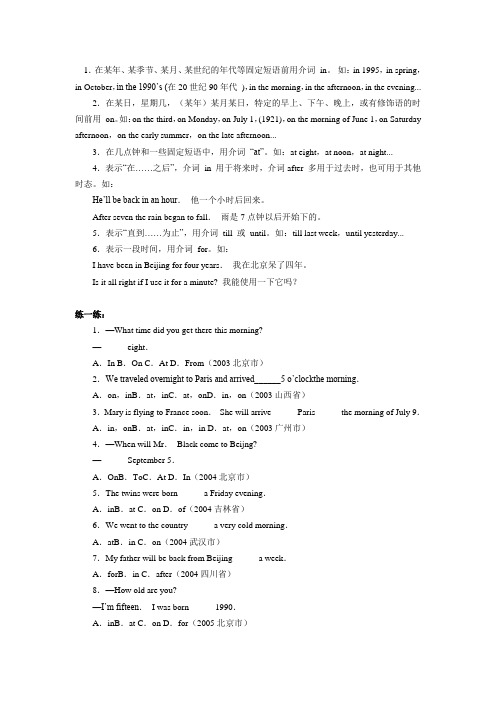
1.在某年、某季节、某月、某世纪的年代等固定短语前用介词in。
如:in 1995,in spring,in October,in the 1990’s (在20世纪90年代),in the morning,in the afternoon,in the evening...2.在某日,星期几,(某年)某月某日,特定的早上、下午、晚上,或有修饰语的时间前用on。
如:on the third,on Monday,on July 1,(1921),on the morning of June 1,on Saturday afternoon,on the early summer,on the late afternoon...3.在几点钟和一些固定短语中,用介词“at”。
如:at eight,at noon,at night...4.表示“在……之后”,介词in 用于将来时,介词after 多用于过去时,也可用于其他时态。
如:He’ll be back in an hour.他一个小时后回来。
After seven the rain began to fall.雨是7点钟以后开始下的。
5.表示“直到……为止”,用介词till 或until。
如:till last week,until yesterday...6.表示一段时间,用介词for。
如:I have been in Beijing for four years.我在北京呆了四年。
Is it all right if I use it for a minute? 我能使用一下它吗?练一练:1.—What time did you get there this morning?—______eight.A.In B.On C.At D.From(2003北京市)2.We traveled overnight to Paris and arrived______5 o’clockthe morning.A.on,inB.at,inC.at,onD.in,on(2003山西省)3.Mary is flying to France soon.She will arrive______Paris______the morning of July 9.A.in,onB.at,inC.in,in D.at,on(2003广州市)4.—When will Mr.Black come to Beijng?—______September 5.A.OnB.ToC.At D.In(2004北京市)5.The twins were born______a Friday evening.A.inB.at C.on D.of(2004吉林省)6.We went to the country______a very cold morning.A.atB.in C.on(2004武汉市)7.My father will be back from Beijing______a week.A.forB.in C.after(2004四川省)8.—How old are you?—I’m fifteen.I was born______1990.A.inB.at C.on D.for(2005北京市)9.The accident happened______a cold winter morning.A.inB.on C.at D.of(2005陕西省)10.I will meet my best friend______the morning of May 1st.A.inB.on C.at(2005青海省)11.I was born July 2,and my birthday is coming soon.A.onB.in C.at D.from(2005常德市)12.______8∶00 of August 8,2008,Beijing will hold the 29th Olympic Games.A.AtB.In C.OnD.By(2005甘肃省)Key:1.C 2.B 3.A 4.A 5.C 6.C 7.B 8.A 9.B 10.B 11.A 12.A。
英语中表示时间的介词

5. I remember Susan left _____a very cold morning of January.
A. in
6. We don’t go to school _____Sundays.
A. on
B. in C. at
D. with
7. Mr. Smith taught English in China ______1997.
on June 1st ,on the morning of July 2 3)morning, afternoon, evening, night, day前有描绘性修饰语 时与on连用;
on that evening, on a cold night, on that day 4)表示周年纪念日;
练习:
1. The story happened ______the evening of August 2.
常用表示时间的介词
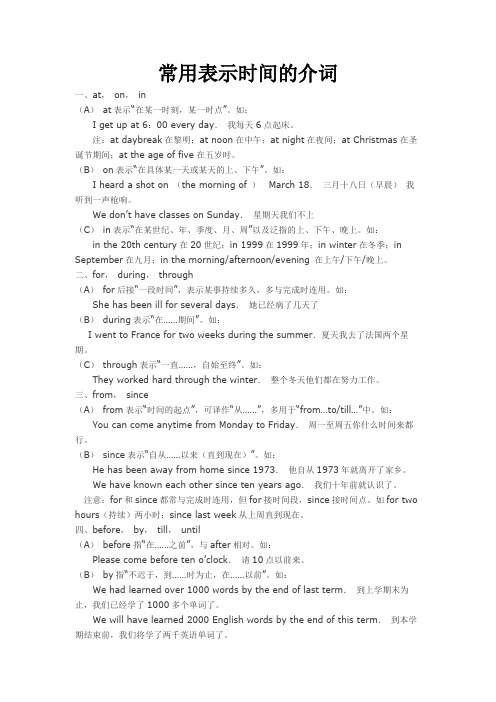
常用表示时间的介词一、at,on,in(A)at表示“在某一时刻,某一时点”。
如: I get up at 6:00 every day.我每天6点起床。
注:at daybreak在黎明;at noon在中午;at night在夜间;at Christmas在圣诞节期间;at the age of five在五岁时。
(B)on表示“在具体某一天或某天的上、下午”。
如: I heard a shot on (the morning of ) March 18.三月十八日(早晨)我听到一声枪响。
We don’t have classes on Sunday.星期天我们不上(C)in表示“在某世纪、年、季度、月、周”以及泛指的上、下午、晚上。
如: in the 20th century在20世纪;in 1999在1999年;in winter在冬季;in September在九月;in the morning/afternoon/evening 在上午/下午/晚上。
二、for,during,through(A)for后接“一段时间”,表示某事持续多久,多与完成时连用。
如: She has been ill for several days.她已经病了几天了(B)during表示“在……期间”。
如: I went to France for two weeks during the summer.夏天我去了法国两个星期。
(C)through表示“一直……,自始至终”。
如: They worked hard through the winter.整个冬天他们都在努力工作。
三、from,since(A)from表示“时间的起点”,可译作“从……”,多用于“from…to/till…”中。
如: You can come anytime from Monday to Friday.周一至周五你什么时间来都行。
表示时间的介词
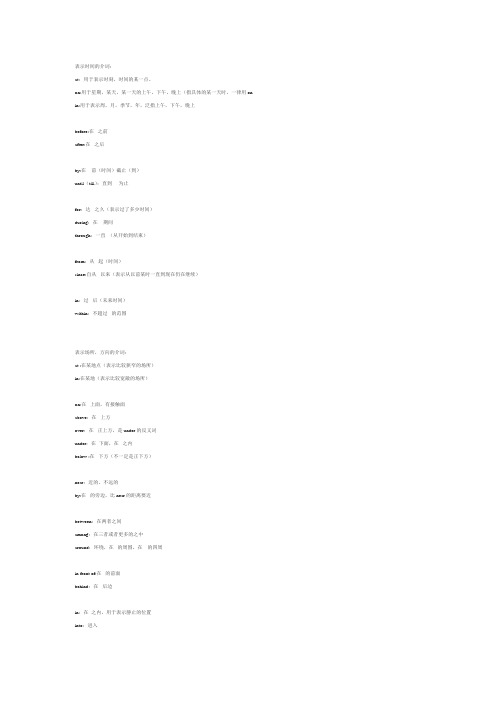
表示时间的介词:at:用于表示时刻,时间的某一点。
on:用于星期,某天,某一天的上午,下午,晚上(指具体的某一天时,一律用on in:用于表示周,月,季节,年,泛指上午,下午,晚上before:在...之前after:在...之后by:在....前(时间)截止(到)...until(till):直到.....为止for:达...之久(表示过了多少时间)during:在....期间through:一直..(从开始到结束)from:从...起(时间)since:自从...以来(表示从以前某时一直到现在仍在继续)in:过...后(未来时间)within:不超过...的范围表示场所,方向的介词:at :在某地点(表示比较狭窄的场所)in:在某地(表示比较宽敞的场所)on:在...上面,有接触面above:在...上方over:在...正上方,是under的反义词under:在..下面,在...之内below :在...下方(不一定是正下方)near:近的,不远的by:在...的旁边,比near的距离要近between:在两者之间among:在三者或者更多的之中around:环绕,在...的周围,在....的四周in front of:在...的前面behind:在...后边in:在..之内,用于表示静止的位置into:进入out of :和into一样,也表示有一定的运动方向along:沿着across:横过(平面物体)through:贯通,通过to :达到..地点(目的地)或方向for:表示目的,为了.....from:从...地点起其他介词with:和..在一起;具有,带有;用某种工具或方法in:表示用什么材料(例如:墨水,铅笔等)或用什么语言。
表示衣着.声调特点时,不用with而用in。
by:通过...方法,手段of:(属于)...的,表示...的数量或种类from:来自(某地,某人),以...起始without:没有,是with的反义词like :像...一样as :作为against:反对,靠着about:关于,各处,四周;询问某人,某物的情况或提出建议表示时间的介词:at:用于表示时刻,时间的某一点。
表示时间的介词用法
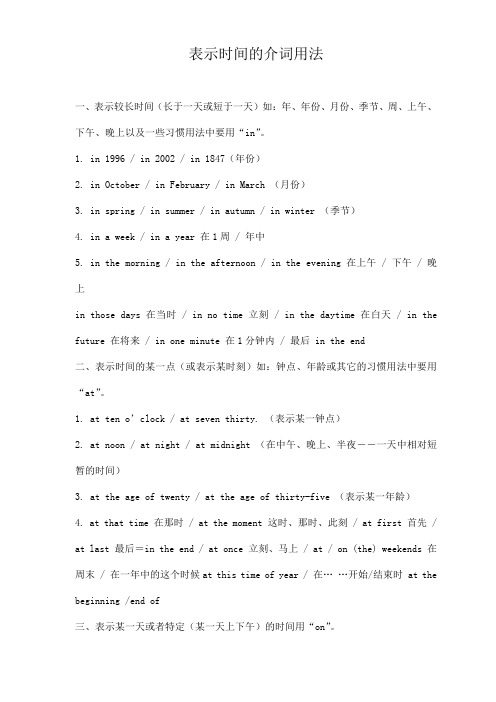
表示时间的介词用法一、表示较长时间(长于一天或短于一天)如:年、年份、月份、季节、周、上午、下午、晚上以及一些习惯用法中要用“in”。
1. in 1996 / in 2002 / in 1847(年份)2. in October / in February / in March (月份)3. in spring / in summer / in autumn / in winter (季节)4. in a week / in a year 在1周 / 年中5. in the morning / in the afternoon / in the evening 在上午 / 下午 / 晚上in those days 在当时 / in no time 立刻 / in the daytime 在白天 / in the future 在将来 / in one minute 在1分钟内 / 最后 in the end二、表示时间的某一点(或表示某时刻)如:钟点、年龄或其它的习惯用法中要用“at”。
1. at ten o’clock / at seven thirty. (表示某一钟点)2. at noon / at night / at midnight (在中午、晚上、半夜――一天中相对短暂的时间)3. at the age of twenty / at the age of thirty-five (表示某一年龄)4. at that time 在那时 / at the moment 这时、那时、此刻 / at first 首先 / at last 最后=in the end / at once 立刻、马上 / at / on (the) weekends 在周末 / 在一年中的这个时候at this time of year / 在……开始/结束时 at the beginning /end of三、表示某一天或者特定(某一天上下午)的时间用“on”。
时间介词 例句大全
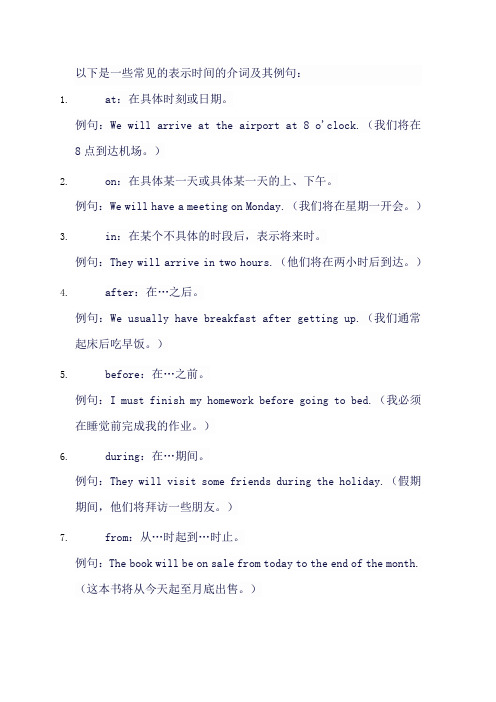
以下是一些常见的表示时间的介词及其例句:1.at:在具体时刻或日期。
例句:We will arrive at the airport at 8 o'clock.(我们将在8点到达机场。
)2.on:在具体某一天或具体某一天的上、下午。
例句:We will have a meeting on Monday.(我们将在星期一开会。
)3.in:在某个不具体的时段后,表示将来时。
例句:They will arrive in two hours.(他们将在两小时后到达。
)4.after:在…之后。
例句:We usually have breakfast after getting up.(我们通常起床后吃早饭。
)5.before:在…之前。
例句:I must finish my homework before going to bed.(我必须在睡觉前完成我的作业。
)6.during:在…期间。
例句:They will visit some friends during the holiday.(假期期间,他们将拜访一些朋友。
)7.from:从…时起到…时止。
例句:The book will be on sale from today to the end of the month.(这本书将从今天起至月底出售。
)8.since:自从…以来,表示过去时。
例句:I haven't seen him since last year.(自从去年以来我就没有见过他。
)9.through:一直到…时为止,表示过去时。
例句:We played basketball all through the summer.(整个夏天我们一直在打篮球。
)10.throughout:贯穿整个…期间,表示将来时。
例句:The project will run throughout the year.(该项目将贯穿全年。
)。
时间介词详解
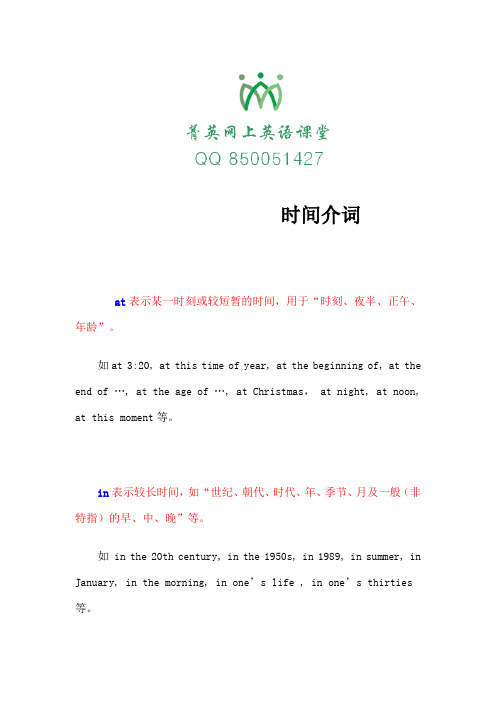
时间介词at表示某一时刻或较短暂的时间,用于“时刻、夜半、正午、年龄”。
如at 3:20, at this time of year, at the beginning of, at the end of …, at the age of …, at Christmas, at night, at noon, at this moment等。
in表示较长时间,如“世纪、朝代、时代、年、季节、月及一般(非特指)的早、中、晚”等。
如 in the 20th century, in the 1950s, in 1989, in summer, in January, in the morning, in one’s life , in one’s thirties 等。
on表示具体某一天及其早、中、晚。
如on May 1st, on Monday, on New Year’s Day, on a cold night in January, on a fine morning, on Sunday afternoon等。
till/by till表示“直到...为止”。
by表示“在...以前”You must wait for him till five o'clock. 你必须等他到5点。
You must finish reading the book by five o'clock. 你必须在5点以前读完这本书。
during“在...期间”during the vacation 在假期期间 during the week 在工作日期间for/since for意为“长达” since 意为“自从”Henry and Kate have been married since 1962.They have been married for a long time.。
时间介词和方位介词
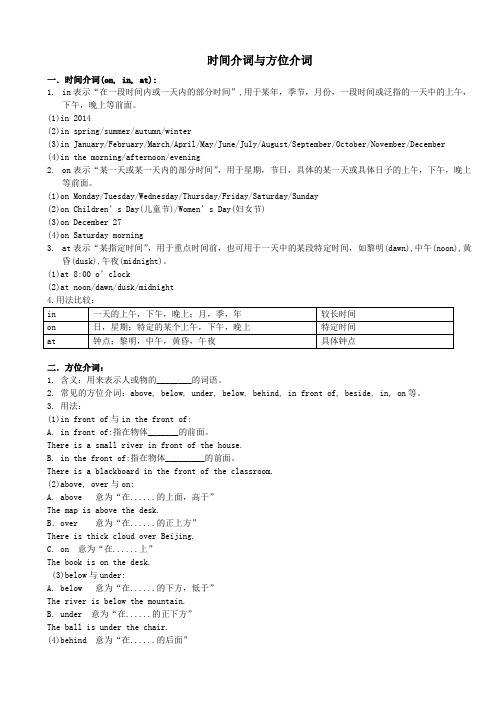
时间介词与方位介词一.时间介词(on, in, at):1.in表示“在一段时间内或一天内的部分时间”,用于某年,季节,月份,一段时间或泛指的一天中的上午,下午,晚上等前面。
(1)in 2014(2)in spring/summer/autumn/winter(3)in January/February/March/April/May/June/July/August/September/October/November/December(4)in the morning/afternoon/evening2.on表示“某一天或某一天内的部分时间”,用于星期,节日,具体的某一天或具体日子的上午,下午,晚上等前面。
(1)on Monday/Tuesday/Wednesday/Thursday/Friday/Saturday/Sunday(2)on Children’s Day(儿童节)/Women’s Day(妇女节)(3)on December 27(4)on Saturday morning3.at表示“某指定时间”,用于重点时间前,也可用于一天中的某段特定时间,如黎明(dawn),中午(noon),黄昏(dusk),午夜(midnight)。
(1)at 8:00 o’clock(2)at noon/dawn/dusk/midnight二.方位介词:1. 含义:用来表示人或物的________的词语。
2. 常见的方位介词:above, below, under, below, behind, in front of, beside, in, on等。
3. 用法:(1)in front of与in the front of:A. in front of:指在物体_______的前面。
There is a small river in front of the house.B. in the front of:指在物体_________的前面。
表时间的介词
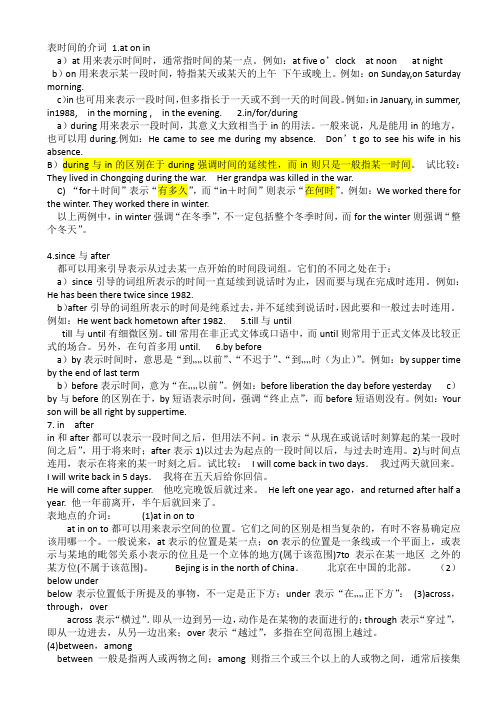
表时间的介词1.at on ina)at用来表示时间时,通常指时间的某一点。
例如:at five o’clock at noon at nightb)on用来表示某一段时间,特指某天或某天的上午下午或晚上。
例如:on Sunday,on Saturday morning.c)in也可用来表示一段时间,但多指长于一天或不到一天的时间段。
例如:in January, in summer, in1988, in the morning , in the evening. 2.in/for/duringa)during用来表示一段时间,其意义大致相当于in的用法。
一般来说,凡是能用in的地方,也可以用during.例如:He came to see me during my absence. Don’t go to see his wife in his absence.B)during与in的区别在于during强调时间的延续性,而in则只是一般指某一时间。
试比较:They lived in Chongqing during the war. Her grandpa was killed in the war.C) “for+时间”表示“有多久”,而“in+时间”则表示“在何时”。
例如:We worked there for the winter. They worked there in winter.以上两例中,in winter强调“在冬季”,不一定包括整个冬季时间,而for the winter则强调“整个冬天”。
4.since与after都可以用来引导表示从过去某一点开始的时间段词组。
它们的不同之处在于:a)since引导的词组所表示的时间一直延续到说话时为止,因而要与现在完成时连用。
例如:He has been there twice since 1982.b)after引导的词组所表示的时间是纯系过去,并不延续到说话时,因此要和一般过去时连用。
最新中考英语复习-表示时间的介词(解析版)
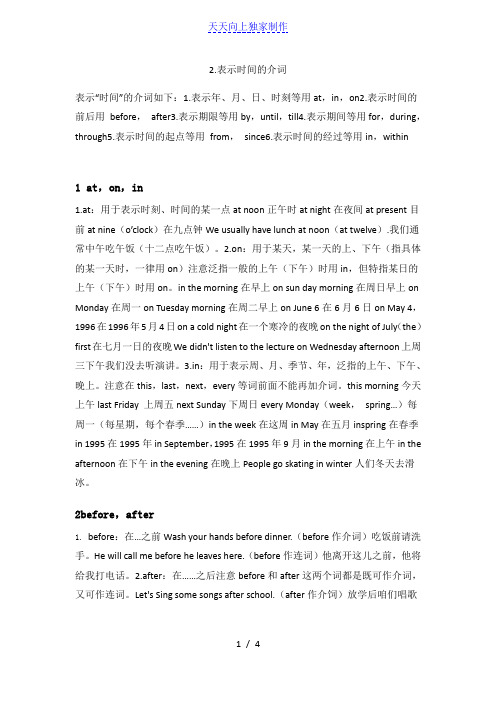
2.表示时间的介词表示“时间”的介词如下:1.表示年、月、日、时刻等用at,in,on2.表示时间的前后用before,after3.表示期限等用by,until,till4.表示期间等用for,during,through5.表示时间的起点等用from,since6.表示时间的经过等用in,within1 at,on,in1.at:用于表示时刻、时间的某一点at noon正午时at night在夜间at present目前at nine(o’clock)在九点钟We usually have lunch at noon(at twelve).我们通常中午吃午饭(十二点吃午饭)。
2.on:用于某天,某一天的上、下午(指具体的某一天时,一律用on)注意泛指一般的上午(下午)时用in,但特指某日的上午(下午)时用on。
in the morning在早上on sun day morning在周日早上on Monday在周一on Tuesday morning在周二早上on June 6在6月6日on May 4,1996在1996年5月4日on a cold night在一个寒冷的夜晚on the night of July(the)first在七月一日的夜晚We didn't listen to the lecture on Wednesday afternoon上周三下午我们没去听演讲。
3.in:用于表示周、月、季节、年,泛指的上午、下午、晚上。
注意在this,last,next,every等词前面不能再加介词。
this morning今天上午last Friday 上周五next Sunday下周日every Monday(week,spring…)每周一(每星期,每个春季……)in the week在这周in May在五月inspring在春季in 1995在1995年in September,1995在1995年9月in the morning在上午in the afternoon在下午in the evening在晚上People go skating in winter人们冬天去滑冰。
常用时间介词
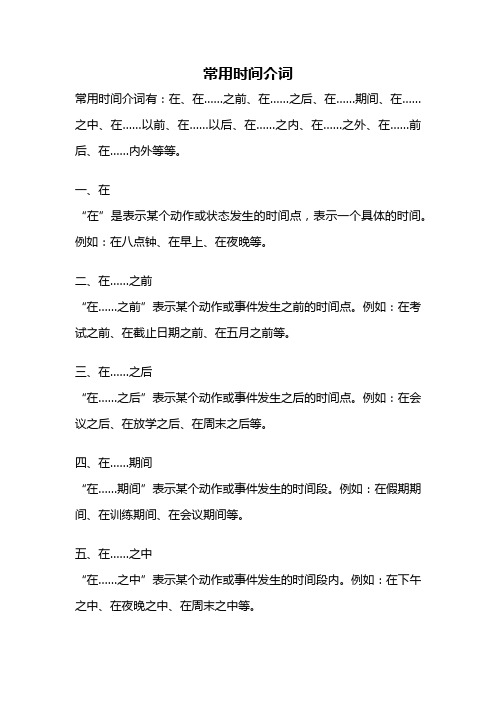
常用时间介词常用时间介词有:在、在……之前、在……之后、在……期间、在……之中、在……以前、在……以后、在……之内、在……之外、在……前后、在……内外等等。
一、在“在”是表示某个动作或状态发生的时间点,表示一个具体的时间。
例如:在八点钟、在早上、在夜晚等。
二、在……之前“在……之前”表示某个动作或事件发生之前的时间点。
例如:在考试之前、在截止日期之前、在五月之前等。
三、在……之后“在……之后”表示某个动作或事件发生之后的时间点。
例如:在会议之后、在放学之后、在周末之后等。
四、在……期间“在……期间”表示某个动作或事件发生的时间段。
例如:在假期期间、在训练期间、在会议期间等。
五、在……之中“在……之中”表示某个动作或事件发生的时间段内。
例如:在下午之中、在夜晚之中、在周末之中等。
六、在……以前“在……以前”表示某个动作或事件发生之前的时间段。
例如:在开学以前、在结婚以前、在十年以前等。
七、在……以后“在……以后”表示某个动作或事件发生之后的时间段。
例如:在毕业以后、在离职以后、在三天以后等。
八、在……之内“在……之内”表示某个动作或事件发生的时间范围内。
例如:在十分钟之内、在两小时之内、在一天之内等。
九、在……之外“在……之外”表示某个动作或事件发生的时间范围之外。
例如:在工作时间之外、在放假时间之外、在上课时间之外等。
十、在……前后“在……前后”表示某个动作或事件发生的时间点前后。
例如:在会议前后、在旅行前后、在考试前后等。
十一、在……内外“在……内外”表示某个动作或事件发生的时间范围内外。
例如:在城市内外、在学校内外、在家里外等。
以上是关于常用时间介词的一些使用方法和示例。
通过合理运用这些时间介词,我们可以更准确地表达出某个动作或事件发生的时间点、时间段或时间范围,使语言更加清晰明了。
在日常生活和工作中,我们要注意使用恰当的时间介词,以避免歧义或误解。
- 1、下载文档前请自行甄别文档内容的完整性,平台不提供额外的编辑、内容补充、找答案等附加服务。
- 2、"仅部分预览"的文档,不可在线预览部分如存在完整性等问题,可反馈申请退款(可完整预览的文档不适用该条件!)。
- 3、如文档侵犯您的权益,请联系客服反馈,我们会尽快为您处理(人工客服工作时间:9:00-18:30)。
时间介词in / on / at / for / from…to / since / during
关于时间的介词
On 表示星期几,具体的某一天和某一天的上午,下午,晚上,意味在、、、、
On Sunday 在星期天 . On May 2nd在5月2日
On Monday evening 在星期一晚上
In
In August 在八月in summer 在夏天in 2012 在2012年
In the morning in the afternoon in the evening At 表示在某一个具体的时间,或表示在一个节假日期间
At six 在六点at night 在晚上
At spring festival 在春节at the weekend 在周末
at mid-autumn festival 在中秋节
1. in表示在某段时间
Year / month / season / morning / afternoon / night / day / century
In summer
In the morning
In April
In 2012
In 19century
2. on表示具体某一天或具体某一天的早上,下午,晚上或一般节日等
On May 1st
On a sunny morning
On Mother’s Day
I will call you on Sunday.
3. at表示在具体的时刻, 钟点,夜里,中午,或某些词组中
At six o’clock
At night
At the end of …..
At last
The meet will be ended at 10 AM.
4. for and in
For + 一段时间,强调某动作或状态持续了多长时间
In + 一段时间:表示将来,译为“…..以后”
I have been here for a week.
She went to Beijing for two days.
My father will come back in a week.
His uncle is coming to visit him in this summer.
5. from…to意思为“从…到…”
I often read novel from six o’clock to seven o’clock in the morning.
6. since “自从….”
I have been teaching English since 2006.
It has been raining since last night.
7. during 表示在某个特定的时间段之间
I will call you during my break time.
时间介词in / on / at / for / from…to / since / during 强化练习:
( ) 1. Children get gifts ____ Christmas and ____ their birthdays.
A. on; on
B. at; on
C. in; in
D. in; on
( ) 2.----There is nothing ____tomorrow afternoon, is there?
-----No. We can have a game of table tennis.
A. on
B. in
C. out
D. up
( ) 3. A lot of students in our school were born____March, 1981.
A. in
B. at
C. on
D. since
( ) 4. He suddenly returned____ a rainy night.
A. on
B. at
C. in
D. during
( ) 5. My grandfather was born____Oct. 10, 1935.
A. on
B. in
C. at
D. of
( ) 6. The train is starting___five minutes.
A. in
B. at
C. for
D.still
( ) 7. Mike does his exercises ____ seven _____ the evening.
A. on; to
B. at; in
C. by; of
D. at; on
( ) 8. Children wake up very early____the morning of Christmas Day.
A. in
B. on
C. for
D. at
( ) 9 ____ a cold winter morning, I met her in the stfeet.
A. In
B. On
C. At
D. For
( ) 10 It happened to be very cold____ the morning of our sports meeting.
A. at
B. on
C. with
D. of
( ) 11. Why did you get up so early ___ this morning.
A. on
B. /
C. at
D. in
( ) 12. He went to Shanghai___ September 3rd, 1991 and came back___ a cold morning last ye ar.
A. in; on
B. on; in
C. on; on
D. in; in
( ) 13. Lucy was born____ the night of May 12, 1984. . ...
A. on
B. in
C. at
D. to
( ) 14. Mrs. Brown came to China ____ 1996.
A.on
B. of
C. to,
D. in
( ) 15 ___ the morning of November 20, 1915, the workers came to Chicago to show their mo urning of Joe Hill.
A. On
B. In
C. On
D. At
( ) 16. Ann moved___Hangzhou___September, 1992.
A. /; in
B. to; in
C. to; on D, in; in
( ) 17. They started off___an autumn afternoon.
A. during
B. at
C. in
D. on
( ) 18. He often goes ____ school ____ six thirty ____ the morning.
A. for; to; in
B. to; at; in
C. to; for; at D, for; at; to
( ) 19. He arrived ___ Shanghai ___ 9: 30 ___ March 5.
A. at; in; at
B. to; on; at
C. in; on; at
D. in; at; on
( ) 20.The English teacher told me to get there____ half past ten.
A: in B. at C. on D. of。
